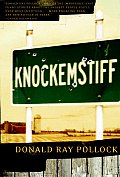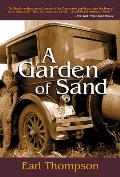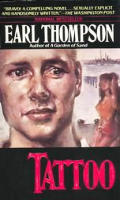
When I was in my teens, I used to spend a lot of time sitting around my aunt's house with my cousins. We'd smoke cigarettes and watch the three channels on the TV and talk about sex and rock and roll and sex and what we were going to do once we left the holler. But it grew boring every so often, all that talk of escape and Blue Cheer and girls we could never have. And during one of those lulls, I noticed a fat yellow paperback that one of my cousins had bought in town lying on the coffee table. Hell, the fact that there was a book in the house was in itself a major event as far as I was concerned. That book was Earl Thompson's
A Garden of Sand, and within the next few months I read it at least five or six times. Later, during one of the times I ran away from home, I missed the damn thing so much that I shoplifted it from a drugstore in St. Petersburg, Florida.
A Garden of Sand was the first book that made me want to be a writer, something I vowed I would do once I made my final escape from Knockemstiff. That was in 1970 or '71, and I was around fifteen years old (yeah, it took me a while!).
 I had never read anything like Thompson's novel. True, it was filled with sex and lice and grime and alcoholism and mean poverty, but it was also beautiful in its own sad and sordid way. The characters were real, so real that I loved some of them and hated others with a passion. And I'd never read a book that had people in it who were so much like the ones I'd grown up around in the holler (though Thompson's world was far rougher). Of course, you must realize that I hadn't read much of anything before A Garden of Sand except the books stored in the small library at Huntington School, and there sure as hell wasn't anything even close to Earl Thompson on those shelves. I'd read some of my old man's "dirty" books, though I knew, even then, that the writing was atrocious. But Earl Thompson could write, and I entered into that Depression-era Kansas world like I was walking through the flimsy screen door into my aunt's house.
I had never read anything like Thompson's novel. True, it was filled with sex and lice and grime and alcoholism and mean poverty, but it was also beautiful in its own sad and sordid way. The characters were real, so real that I loved some of them and hated others with a passion. And I'd never read a book that had people in it who were so much like the ones I'd grown up around in the holler (though Thompson's world was far rougher). Of course, you must realize that I hadn't read much of anything before A Garden of Sand except the books stored in the small library at Huntington School, and there sure as hell wasn't anything even close to Earl Thompson on those shelves. I'd read some of my old man's "dirty" books, though I knew, even then, that the writing was atrocious. But Earl Thompson could write, and I entered into that Depression-era Kansas world like I was walking through the flimsy screen door into my aunt's house.
A Garden of Sand was Thompson's first novel, and he would go on to write three more before he died of a heart attack in 1978 at the age of forty-seven in Sausalito, California (one of those, The Devil to Pay, was published posthumously). Today, few people read him, or have even heard his name, and that's a shame. So here's what I'm getting at with all this: a couple of years ago, I decided that I would write a biography of Earl Thompson. Believe me, I didn't even know how to begin, but I somehow managed to get in touch with his literary executor, Gilmer Waggoner, who had also been Thompson's accountant. However, Waggoner, a good man who loved Thompson and his work, was in failing health, and I mostly corresponded with his wife, a fantastic lady who even managed to find me the addresses of one of Thompson's children and an ex-wife. But I also began to discover that I didn't have the patience (or the money) for the kind of research necessary. Many of the facts about Thompson's life weren't easily available, and he'd moved around a lot. So, in the end, I gave up, emailed Mrs. Waggoner that I was going to have to put the project on the backburner while I concentrated on my own fiction (a poor excuse). And ever since then, I've harbored some guilt about that decision, partly because the Waggoners seemed so excited that someone was finally going to bring their friend some of the attention he deserves, and partly because I feel like I owe Thompson big-time. Who knows? If I'd never read his novel, I might not be writing today.
 Last night, when I decided I'd write about Thompson on this blog, I discovered that A Garden of Sand is now out of print (the last paperback edition was published by Carroll & Graf in 2001). Granted, it's still fairly easy to buy a used copy, but, Jesus, this isn't a book that should ever go out of print. So today, I urge all of you to buy it before you miss your chance (and if you've still got a few coins left, pick up Tattoo, his second one). And I'd also like to propose that you all think about the first book that really knocked your head off, it was so friggin' good. And heck, while we're at it, let's pray that some brave souls finally begin working on those few biographies that truly deserve to be written.
Last night, when I decided I'd write about Thompson on this blog, I discovered that A Garden of Sand is now out of print (the last paperback edition was published by Carroll & Graf in 2001). Granted, it's still fairly easy to buy a used copy, but, Jesus, this isn't a book that should ever go out of print. So today, I urge all of you to buy it before you miss your chance (and if you've still got a few coins left, pick up Tattoo, his second one). And I'd also like to propose that you all think about the first book that really knocked your head off, it was so friggin' good. And heck, while we're at it, let's pray that some brave souls finally begin working on those few biographies that truly deserve to be written.